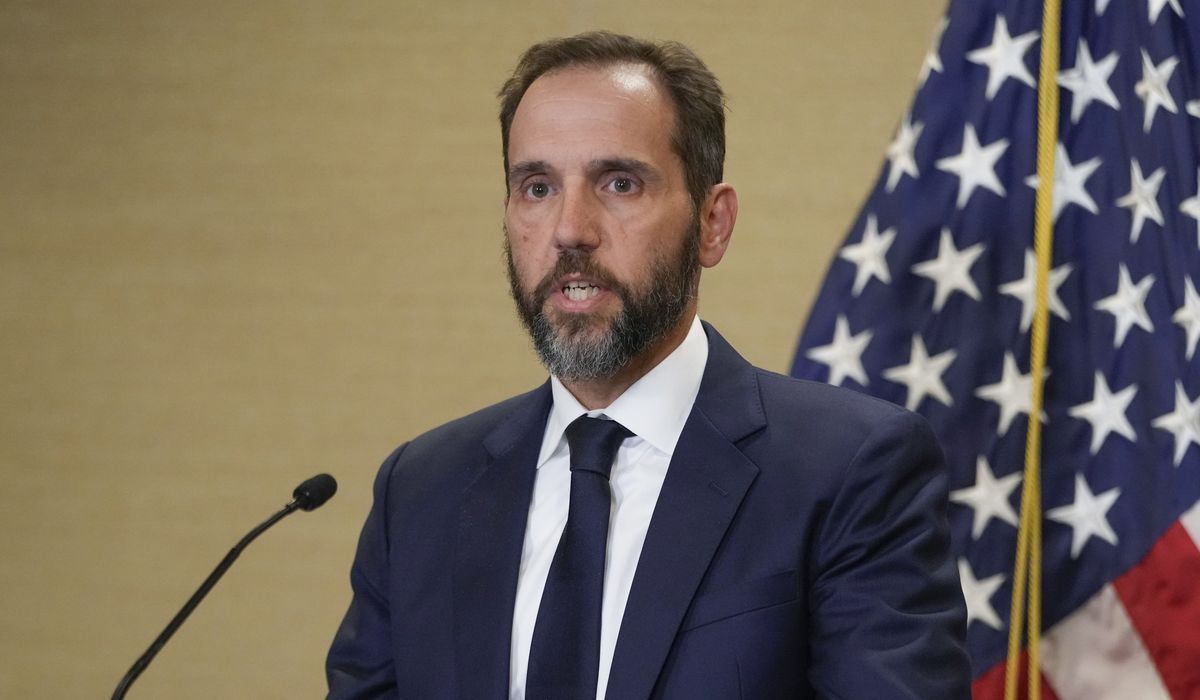


If former President Donald Trump gets reelected, he could derail the federal legal cases against him, according to legal experts who said he’d have several ways to get out of the jam once he’s back in the White House.
But the two cases brought under state laws present different challenges for Mr. Trump, who now faces a total of four different prosecutions charging him with crimes related to the 2016 campaign, the 2020 election and hoarding classified documents once he left office.
The prosecutors in the cases are pushing for early trials, and that’s for good reason. If Mr. Trump wins reelection and gets into office before a verdict is rendered, he could shut down the federal cases.
Mr. Trump could order his new attorney general to disband the special counsel and drop the charges altogether.
“I am skeptical that either one of these cases can actually go to trial before next year’s election,” said Joseph Moreno, a former federal prosecutor. “As long as Trump has not been convicted … and then becomes president, I am fairly certain he could stop the process.”
Mr. Trump could also choose to pardon himself at any time — even before a trial takes place. That’s known as a preemptive pardon.
He posted on Twitter in 2018 that he has “the absolute right to PARDON myself.” He reportedly pondered the idea in 2020, before leaving office, but never took any action.
A self-pardon would be an unprecedented flex of the Constitution’s pardon power, which grants a president wide latitude to issue clemency except in cases of impeachment.
Then the question would be whether anyone could show a sufficient legal injury to have standing to challenge the pardon and win a court ruling overturning it.
“I don’t think anybody could stop it,” Mr. Moreno said.
Mr. Trump’s legal team declined to comment for this story.
“That’s privileged information and I can’t talk about it,” said Alina Habba, who has served as spokesperson for the president on his legal challenges.
Mr. Trump could argue that a sitting president can’t face trial, similar to the decades-old Justice Department policy of not charging a sitting president with a crime while in office, a point that came up during the Mueller investigation into alleged collusion with Russia during the 2016 election.
But if Mr. Trump faces state trials while elected president, Mike Davis, president of the Article III Project and a former clerk to Justice Neil Gorsuch, said it would cause a “constitutional crisis.”
“Federal law mandates that the president, the former president, and the president-elect have Secret Service protection. Do these local Democrat DAs think they’re going to put these Secret Service agents in the jail cell with President Trump?” Mr. Davis said.
Mr. Moreno said a president could ignore the state charges and just avoid going to that jurisdiction, but perhaps the more appropriate route for a state to take would be to present its case to Congress.
“Ask Congress to impeach and remove the president, and then the state can go for it,” he said.
Special counsel Jack Smith has brought two sets of charges against Mr. Trump at the federal level. One case accuses him of keeping secret documents that should have been turned over to the government. The case is pending in the Southern District of Florida with a trial date scheduled for May of 2024, though experts say it likely will be delayed further into the election year.
Mr. Smith’s other case accuses the former president of fueling the 2020 election chaos by intentionally misleading the country about the results, and pushing for Congress and states to overturn President Biden’s win.
That case is pending in Washington, with a trial date not yet set. Like the Florida one, though, it could also be delayed close to — or beyond — the election.
“Delay is always to his advantage,” said Elliot Mincberg, a senior fellow at the liberal advocacy group People For the American Way. “He can pretty surely get out of the federal offenses if he is elected.”
In the state cases, New York has charged Mr. Trump with falsifying business records concerning hush payments to two women and a hotel doorman.
In Georgia, the Fulton County district attorney this week charged Mr. Trump and 18 other individuals with crimes related to his effort to have Georgia overturn Mr. Biden’s victory in the state in 2020.
Mr. Mincberg said those cases are more challenging for Mr. Trump.
“He doesn’t have power at the state level even if he becomes president,” Mr. Mincberg said.
Mr. Trump would have to rely on state pardon boards, which typically — in both New York and Georgia — require the convicted person to have served part of their sentence before receiving a pardon.
It’s unclear whether a governor could order a state prosecution dropped. Similarly, it’s unlikely a Democratic governor in New York would suspend the state’s charges against a Republican president.
But Mr. Moreno said there’s only a “chance” the president could face jail time. He said it’s unlikely a state would send a former president, who is almost 80 years old, to prison.
“I don’t know how that serves the system of justice,” he said.
Instead, he suggested house arrest or probation could be issued at sentencing should Mr. Trump face conviction.
• Jeff Mordock contributed to this report.
• Alex Swoyer can be reached at aswoyer@washingtontimes.com.
